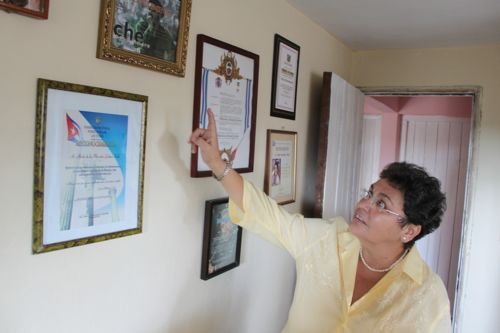In cash-deprived Cuba, government loyalists are taught to sacrifice for the revolution, putting homeland above personal needs. That, everyone knows, is how patriots behave. By all appearances, Aleida Godínez was not a patriot.
She flaunted her wealth, wearing new clothes and shoes. She had a personal chauffeur. Her refrigerator was always full. For 15 years, Godínez led the life of what Cuban authorities describe as a "counter-revolutionary." She headed an independent labor organization, served as secretary to one of the island's top dissident leaders and attended cocktail receptions at the posh residence of the U.S. ambassador in Havana. In short, she was what government loyalists call a "worm," scum of the worst sort.
But it was all an act. In reality, Godínez was Agent Vilma, a Cuban government operative. Her mission: Infiltrate the Cuban dissidency and gather evidence against anti-Castro activists. And in the process, some of the U.S. pro-democracy funds aimed at supporting Cuban dissidents wound up in her hands, instead.
"American people are misinformed about these things," Godínez claimed. U.S. taxpayers who support pro-democracy spending toward Cuba "think that they're building a better society," she continued, but "they're throwing the money away." Godínez, 56, contends that most U.S. funds budgeted for Cuban pro-democracy programs never reach the island. "It's a business," she explained. Private contractors, non-profits and other groups in Miami and Washington spend most of the money before it ever reaches Cuba.
U.S. officials have acknowledged many risks and pitfalls in trying to help Cuban dissidents, and that money does not always reach its intended target. But they claim they are working to improve both efficiency and accountability. Still, Godínez's connection to Cuba's dissident movement earned her thousands of dollars every year, much more than average workers making $15 or $20 per month. Asked if she was obliged to turn over any of the money to the socialist government, she replied, "No, I spent it. I had to live the part. I had a driver who was paid $20 a day. That's a lot of money in Cuba."
The Cuban government revealed Godínez's identity in March 2003 after arresting 75 pro-democracy activists, independent journalists and others, including the dissident leader that Agent Vilma had befriended and later betrayed. Godínez became a star witness for the prosecution and the dissidents were sent to prison. Nowadays, the former Agent Vilma works as a journalist, writing accounts of her undercover life, and is working on a book.
Anti-government activists consider her a traitor of the worst kind, but by Cuban officials she is lauded as a hero who defended her government. Godínez points with pride to the awards and commendations hanging from the wall at her home office. While she welcomed the money she earned as Agent Vilma, she doesn't plan to go undercover in the future. "I don't want to live that again."
